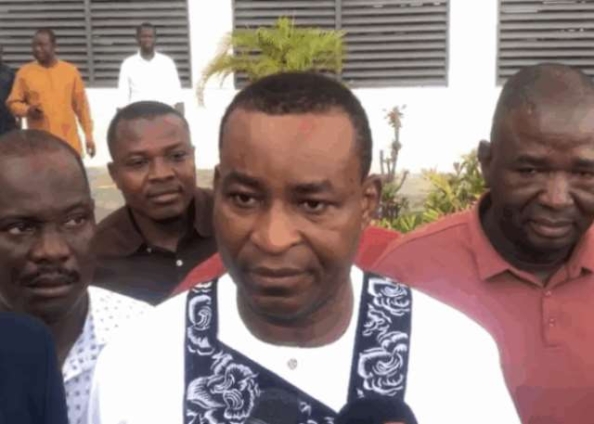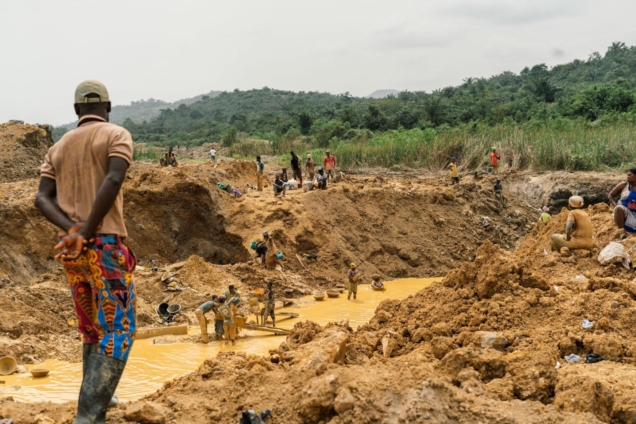Ghana's Silent Killer: Galamsey Toxins Spark Cancer Fears, Urgent Calls for State of Emergency

Ghana faces a profound national crisis in the form of galamsey, or illegal mining, a destructive phenomenon that has transcended mere illegal activity to expose deep-seated systemic failures and institutional complicity. Far from being solely the domain of impoverished individuals, galamsey operations are enabled by the clandestine movement of heavy-duty equipment like excavators and smuggled mercury, along with the ability to deter law enforcement, block journalists, and defy court orders—actions that necessitate significant backing.
A central enigma in Ghana’s galamsey challenge is the unexplained entry of thousands of excavators into the country. Despite involving rigorous processes such as shipping documents, customs clearance, and state oversight, these massive machines frequently bypass official channels, ending up deep within forest reserves and on riverbanks. Adding to this mystery are frequent reports of “missing excavators” that, despite being seized by authorities, vanish without a trace. This points to a pervasive corruption that starts not at the mining pits, but at the very “gates of power,” implying that state institutions responsible for oversight are actively or passively enabling these illicit activities.
Ghana’s history with anti-galamsey initiatives, including “Operation Vanguard” and “Operation Halt,” is marred by repeated failures. Despite burning excavators publicly and enacting stricter laws, illegal mining consistently resumes once public attention wanes. This pattern has led many to question whether enforcement is genuinely failing or if it is intentionally allowed to falter. Allegations from civil society groups, journalists, and even parliamentarians suggest political patrons and financiers are complicit, with security officers reportedly guarding illegal sites or tipping off miners. Local chiefs and political figures are also accused of accepting bribes for their silence, transforming galamsey from a simple law-and-order issue into a severe governance crisis, where the very institutions meant to stop it may be sustaining it.
The devastating environmental impact of galamsey has prompted the Pharmaceutical Society of Ghana (PSGH) to declare it a national public health emergency. The Society, concluding its 2025 Annual General Meeting (AGM) themed “Strengthening Pharmacy for Primary Healthcare,” highlighted that galamsey activities have led to widespread contamination of critical water sources, destruction of arable land, and elevated levels of mercury and other toxins. Over 60% of Ghana’s major rivers, including the Pra, Ankobra, and Offin, are now heavily polluted. This environmental degradation, estimated to cost Ghana up to $2 billion annually, manifests in increased waterborne diseases, compromised food safety, and threats to local pharmaceutical manufacturing, which relies heavily on clean water and agricultural inputs.
Beyond addressing galamsey, the PSGH also called for a comprehensive overhaul of Ghana’s healthcare landscape. Key recommendations include integrating over 5,000 community pharmacies into the national primary healthcare system through a formal framework. They advocate for a “Pharmacy First” policy, positioning pharmacies as the initial point of contact for minor illnesses, preventive services like vaccinations, and chronic disease management, particularly as non-communicable diseases (NCDs) now account for over 40% of deaths in Ghana. Additionally, the PSGH emphasized the urgent need to recruit 1,621 qualified pharmacists currently awaiting government employment, stressing that Ghana’s pharmacist-to-population ratio of 1:8,500 is significantly below the WHO-recommended minimum of 1:2,000. The Society also proposed leveraging the 24-hour economy policy to boost local pharmaceutical production, reduce import dependency (currently over 70%), and create jobs.
Further underscoring the severity of the crisis, Dr. Ekpor Anyimah-Ackah, a food systems toxicologist and health risk assessment expert, urged President John Mahama to invoke a targeted state of emergency in galamsey hotspot areas. Speaking on JoyNews’ Newsfile, Dr. Anyimah-Ackah argued that past anti-galamsey operations have failed to curb the increasingly dangerous and entrenched activities of armed operators. Citing Article 31 of Ghana’s Constitution, he clarified that a state of emergency could be strategically applied to provide the President with the legal authority for swift, coordinated, and lawful intervention against armed racketeers, all while upholding human rights protections.
True political will, according to analysts, would mean prosecuting not only the miners at the pits but also the financiers in boardrooms and the officials who turn a blind eye. It demands tracing money trails from gold buyers to export permits and exposing those who profit from this destructive economy. Such will would also involve protecting whistleblowers, adequately resourcing regulators, and publicly naming offenders, fostering a level of transparency that assures citizens of equitable law enforcement. This entire ordeal is a test of Ghana’s national integrity, challenging whether the Republic can protect its natural resources and future generations from being sacrificed for short-term gains. Until Ghana confronts the “big men” behind the concessions, the financiers behind the excavators, and the power brokers behind the impunity, the state risks proving that it has been captured by galamsey interests, a presence that looms not only in the forests but also in the corridors of power. The PSGH, under its new executives including President Dr. Paul Owusu Donkor, Vice President Pharm. Peter Gyamfi, Honorary Treasurer Dr. Anna Naa Kwarley Quartey, and Executive Member Pharm. Lucia Addae, has reaffirmed its commitment to collaboration, highlighting that a stronger pharmacy sector is crucial for a resilient healthcare system.
You may also like...
Shocking Claims: Star Striker Victor Osimhen Faces Lifelong Medical Battle!

Turkish football doctor Ahmet Çakar has made serious, unconfirmed claims about Nigerian striker Victor Osimhen's lifelon...
Breaking: Boxing Legend Tyson Fury Confirms Comeback, Return Date Set!

Boxing promoter Frank Warren has confirmed that Tyson Fury is planning a return to the ring next year, despite his earli...
Jared Leto's 'Tron: Ares' Ignites Furious Debate: A Sci-Fi Masterpiece or a Buggy Disaster?

Disney's latest attempt to revitalize the "Tron" franchise, "Tron: Ares," aims to simplify its narrative while retaining...
Michael Mann's 'Heat 2' Officially Ignites: Blockbuster Sequel Finds New Home at Amazon MGM!

Michael Mann's long-awaited "Heat 2" is officially moving forward, finding a new studio home at Amazon MGM-owned United ...
Diddy's Pardon Plea Ignites Firestorm: 50 Cent Slams Trump Confirmation

Sean "Diddy" Combs' recent 50-month prison sentencing for federal prostitution law violations has taken a new turn with ...
Zach Bryan's ICE Lyrics Spark White House Backlash: 'Americans Disagree'

Zach Bryan has ignited a political firestorm with a snippet of an unreleased song critical of ICE, drawing swift condemn...
J.Lo & Ben Affleck: Hollywood's Power Couple Lights Up Red Carpet Once More

Jennifer Lopez and Ben Affleck reunited on the red carpet for the New York City premiere of 'Kiss of the Spider Woman,' ...
One Direction Star Louis Tomlinson's Raw, Emotional Farewell to Liam Payne

Louis Tomlinson has opened up about the profound grief following the tragic death of his friend and former One Direction...




